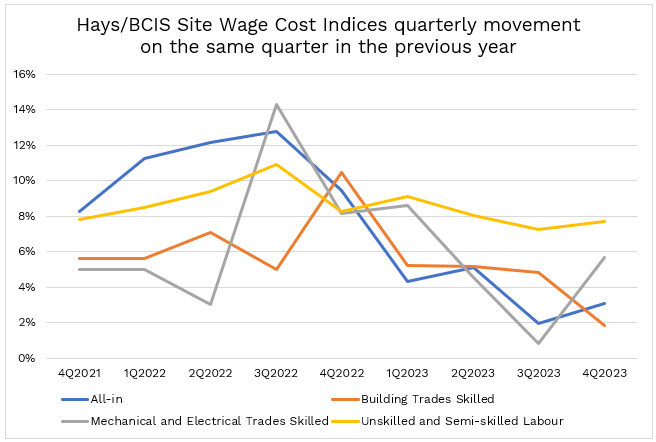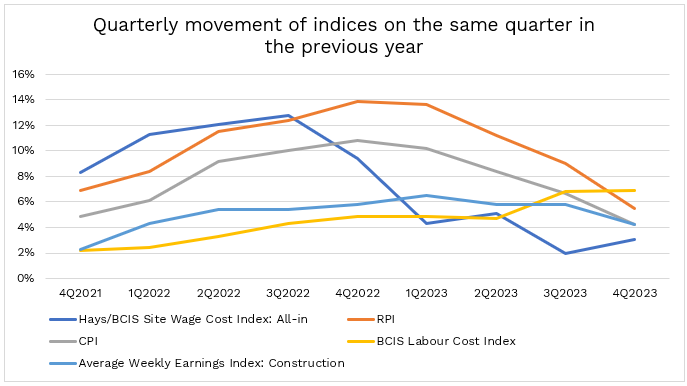Construction site wages were down by an average of 0.7% in 4Q2023 compared with the previous quarter, and up by 3.1% on an annual basis, the latest data from the Hays/BCIS Site Wage Cost Indices shows.
Compared with 3Q2023, unskilled and semi-skilled workers’ wages showed the only growth, while all other index values decreased or remained static.
| Skill Level | Percentage change 4Q2023 on: | |
| 3Q2023 | 4Q2022 | |
| All-in | -0.7% | 3.1% |
| Building Trades Skilled | -2.8% | 1.8% |
| Mechanical and Electrical Trades Skilled | -0.8% | 5.7% |
| Plant Operatives | 0.0% | 0.0% |
| Unskilled and Semi-skilled | 0.4% | 7.7% |
The greatest annual growth was also seen among unskilled and semi-skilled workers, whose pay was on average 7.7% higher than in 4Q2022, while plant operatives’ wages remained unchanged for the year.

BCIS Solutions Architect Paul Burrows, who compiles the indices for BCIS and Hays, said: “While unskilled rates are being pushed upwards by increases to the National Living Wage, declining workload is pushing rates down for the higher skilled roles and in the middle we have no movement.
“Overall, this is compressing the wage scale for construction site labour, effectively reducing the gap between the highest and lowest paid grades.”
Hays also reported fewer construction job placements in 4Q2023, continuing a decrease which has been seen since 2Q2021.
Burrows said: “The latest figures from ONS show that overall output in the construction sector in 4Q2023 was in negative territory, which was a significant contributor to the UK economy entering into recession in the same period.
“New orders data, which is a snapshot of future work, was down 30.2% in 4Q2023 compared with 4Q2022, so upwards pressure on wages isn’t likely to be an issue in the short-term.”
The Hays/BCIS Site Wage Cost Indices are produced using market data from Hays Recruitment, generally representing labour requirements for immediate fulfilment. Because of this, the indexes tend to be more volatile and faster to react to changes in market conditions than other labour indices.
The BCIS Labour Cost Index, for example, incorporates the movement in nationally agreed wage awards, which are generally updated annually, across the industry.
Promulgated rates that took effect in January 2024 include a 7% increase for plumbers and electricians in England and electricians in Scotland, and a 1.5% increase for asphalters.

Notes:
BCIS works with Hays Recruitment to track movement in the cost of site labour in the construction industry by providing the Hays/BCIS Site Wage Cost Indices.
The indexes were launched at the beginning of 2020 and are based on market data provided by Hays, reflecting movement in the market for agency labour on a quarterly basis. For more information about BCIS, visit the website at www.bcis.co.uk
Building, Design & Construction Magazine | The Choice of Industry Professionals





